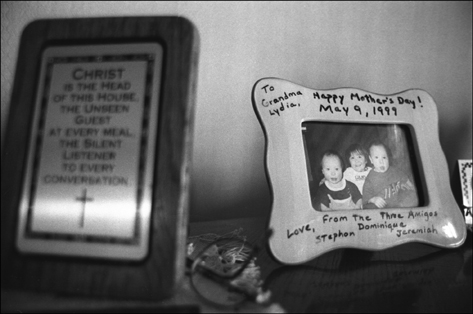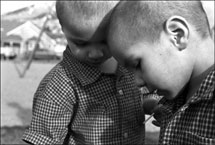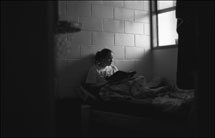When
Javon Montes found out she was pregnant with twins at age 19
she had nowhere to turn but to her parents.
Although James and Lydia Montes’ home in Box Elder on
Montana’s Rocky Boy’s Reservation was already full
with Javon and three younger siblings, they didn’t hesitate
to add two more infants to the household.
Identical twins Jeremiah and Stephon came to a home already
shared by an infant cousin, born to Javon’s sister LeAnn
just a month before Javon realized she was pregnant.
James and Lydia Montes were not happy that their teenage daughters
found themselves single mothers. But they make it clear immediately
that they would help in whatever ways they could.
"I just assured her that I would support her and that I
loved her, and I trusted that gave her a peace of mind,"
Lydia Montes says.
The birth rate for Native American women ages 15 through 19
in Montana is more than three times that of white teenagers
in the state.
And while parents and health educators say teen pregnancies
are certainly not encouraged, they emphasize that in Indian
families all children are welcome children. Often grandparents
play a major role in these extended families.
Indians consider all life "a borrowed gift from God,"
says Pauline Standing Rock, a bilingual Head Start teacher in
Box Elder. Regardless of the situation, families give all the
support and love they can, and that extends to teen pregnancies,
she says.
Marilyn Sutherland, a social worker at Rocky Boy’s since
1975, says she has seen a change in attitudes toward young mothers.
"Children are a blessing," she says. "I don’t
think anyone thinks that they are ever bad. People may not like
it if their young daughter gets pregnant, but you do what you
can do."
What’s more, if a mother finds herself too overwhelmed
to properly raise a child, relatives are almost always willing
to step in.
"In all my years that I’ve worked here, as long as
you know they’re your blood, you’re gonna do whatever
you can to keep them," Sutherland explains.
Indeed, abortion is far less frequent among pregnant Indian
teens than among their white counterparts. For every seven births
to Indian teenage mothers in Montana, there is one reported
abortion. For white teens in the state, however, the ratio is
close to one abortion for every two live births.
And adoptions—influenced in some measure by the Indian
Child Welfare Act, which gives strong preferences to Indian
adoptive families when Indian children are involved—are
usually to relatives of the child.
Javon never thought of giving up her boys because she knew she
would have her parents to lean on.
She lived with them in the year after the twins were born and,
with their encouragement and support, returned to Stone Child
College at Rocky Boy’s Agency, where she had completed
her first year, to finish an associate of arts degree.
Today Javon is married to Ivan, the father of the twins, and
working toward a degree in English at the University of Montana.
Without the aid of her parents Javon’s return to school
would have been impossible. Her parents watched the boys when
she attended class and helped her in ways big and small. Their
assistance was both emotional and financial. For example, they
had her retire her two-door pickup and gave her their new four-door
Mazda. In Missoula she also finds support from sisters LeAnn,
a Lady Griz basketball player who is married and raising 4-year-old
Dominique, and from Aimee, a freshman at UM who also plays basketball.
Javon, Ivan and the rambunctious identical twins recently moved
from married student housing to an apartment in Missoula’s
South Hills near where LeAnn lives.
She says her relationship with her sisters has helped her succeed
where others faced with the same circumstances have floundered.
LeAnn and Javon depend on one another for help with their kids.
"We’re definitely each other’s babysitters,"
LeAnn says.
During the basketball season Javon often takes care of Dominique
during practice. When the games take LeAnn away for several
days, Dominique often stays with Javon. Although LeAnn is married,
her husband attends UM and also works, so knowing Javon can
watch Dominique eases her parents’ minds.
"Always having to depend on each other, it’s made
us build a stronger relationship towards one another,"
LeAnn says.
The sisters spend as much shared time as they can and always
try to cook a big family meal together once a week. And their
getaways to Wal-Mart let them feel like college students combing
for bargains more than mothers trying to juggle many balls.
The Montes family has always pulled together. The success of
having two daughters play college ball is one measure. And for
every home game, James and Lydia pile Colton, Jamie and, frequently,
the children’s grandmother into a car for the five-hour
drive to Missoula. The family’s Flathead-area relatives
also make the trip. At the motel grandpa James likes to frolic
in the pool with Jeremiah and Stephon under his arms and Dominique
on his back.
Yet, despite all the support that Javon receives from family,
revealing her pregnancy was emotionally taxing.
"I wasn’t exactly scared of my mom’s wrath
coming down on me, it was more like I’d be a disappointment
to my parents," Javon says.
Her father had always encouraged her to do her best, be it on
the basketball court or in the classroom. But like his wife
he accepted the fact with calm and helped his daughter prepare
for the birth in whatever ways he could.
Nearly half the children born in Hill County, which includes
Havre, the Rocky Boy’s Reservation and a half-dozen small
towns along U.S. Highway 2, were born to unwed mothers, according
to 2000 census figures.
So while the birthrate for Native American females is higher
than that for whites, it’s obvious the fact many unmarried
women are having children is not an Indian phenomenon. However,
some Indian health educators say one reason for the high birth
rate is that contraception is not in keeping with old customs.
But neither, they say, were children out of marriage.
"In the old days you couldn't have a child out of wedlock;
it was taboo," says Alberta St. Pierre, a nurse who has
worked at Rocky Boy’s Indian Health for 25 years. But
that taboo didn’t mean Indians embraced modern methods
of contraception.
"The less Indian you are the more likely it is that you
will use contraception," St. Pierre says.
Javon says she wrestled with her religious beliefs before she
got pregnant.
"I wanted to get on birth control, but it was more a moral
issue," she explains. "I wanted to get on it because
I didn’t want to get pregnant, but I knew it wasn’t
right, that I shouldn't be having sex at all, but while I was
in the middle of all that I got pregnant."
Even with her parents’ emotional support when they learned
of her pregnancy, Javon says she lost a lot of self-esteem and
confidence.
"I was really scared to get back out there," she recalls.
"I wondered, how will I do this, how will I face my classmates?"
But she made herself meet the challenge. She made herself be
strong.
"When the boys were born, just seeing their faces and hearing
them cry, it was like nothing I’ve ever experienced before,"
Javon says.
"The fact that I wasn’t only living for myself anymore,
and taking care of just my needs, doing what I wanted to do,
now I had two little guys that depend on me more than anything
else."
And taking the step to register for school helped her regain
her confidence.
"It was like a light bulb lit up," her mother says.
"I could see a whole different her and I was really happy."
Not long after, Javon was ready to move to Missoula with her
boys to enroll at UM, but even with the progress she had made,
life as a university student with twin sons is not easy. Though
LeAnn was there to help, Javon was a single mother and getting
everything done was exhausting.
Now with Ivan’s help her routine is a little less hectic.
She starts her day by reading scriptures, praying and writing
in her journal. When she and Ivan rouse the boys, the twins
pull the covers over their heads and dig in, but their protests
don’t last long. They pull matching tees and hooded sweatshirts
over their heads and their dark, buzz-cut hair pops through
first, framing soft, brown eyes. The boys look identical but
Javon says they don’t act the same. Stephon is the bigger
of the two, and Javon calls him the daddy’s boy. Jeremiah
is smaller and constantly gives Javon hugs and kisses and tells
her that he loves her.
Religious faith is strong in the Montes family. They use scriptures
as a guide and their Pentecostal beliefs are their anchor. Lydia
Montes also taught Sunday school at the Assembly of God on Rocky
Boy’s Reservation for 12 years.
"I always encouraged the girls to trust in Him," Lydia
says. Javon says she focused on spirituality to overcome her
depression after finding she was pregnant.
"You find yourself stuck in the worst situation and you
don’t know where to turn, and the only way you can turn
is spiritually, and within yourself," Javon says. "That’s
what I did, I checked myself spiritually and said, "OK,
where am I going now?"’
Still today Javon calls Lydia when she feels she needs spiritual
guidance and they look up scriptures over the phone.
It’s that support and love that allows Javon to succeed.
"I know that if I wasn’t in the family that I’m
in and the support and love … I don’t know where
I’d be," she says.
back to top...
|
|
|
|
Stephon,
left, Jermiah Montes, both 4, play with toy frogs and lizards
their mother, Javon, put into their Easter baskets. |
|
|
Montes
takes a break away from her Spanish homework to hug and
kiss her son, Jeremiah. Montes says that Jeremiah is the
more affectionate of the two twins in the morning, and he
will usually come and hug and kiss her first thing when
he wakes. |
|
|
Lydia
Montes, left, laughs as her daughters Javon, middle, and
Amy, right, sift through their father's collection of vinyl
records for Amy to listen to for her History of Rock-n-roll
class at the University of Montana. Three Montes daughters
attend the Missoula school. |
|
|
Javon
Montes, left, and her sister LeAnn, right, cook Easter dinner
and attempt to chat with each other while their children
try to grab their attention. |
|
| Montes
spends some alone time at 8 a.m. reading scriptures from
a Bible her mother gave her. By getting up at about 7 a.m.
every morning, Montes is able to reserve some time for herself
before her family awakens. |
|






